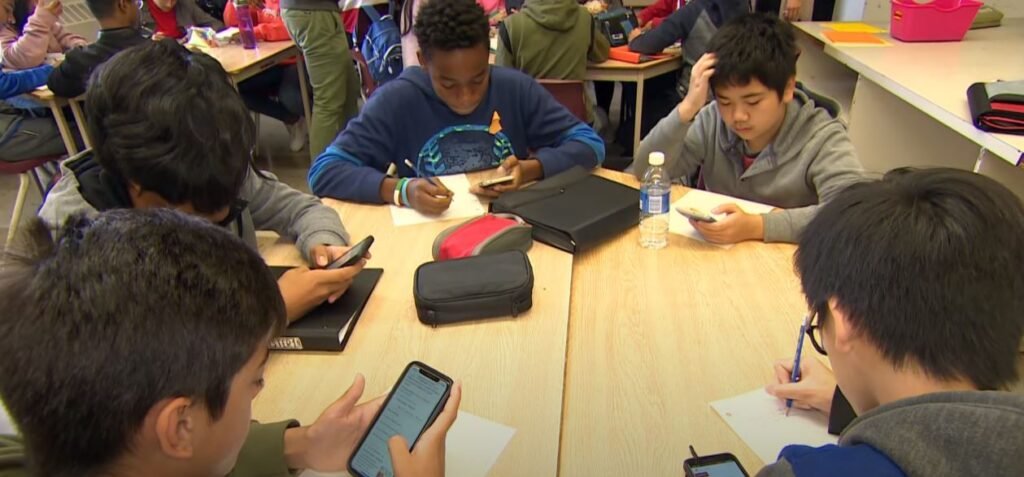Is mobile phone good for students?
Why is mobile phone good for students?
Mobile phones are a need in today’s world. Nearly every young learner has one, and it’s a tool that has altered the nature of education itself. It might be difficult to adjust to the digital world. Although they can all seem a little daunting at times, social media, smartphones, the internet, and limitless resources are all necessary.
It goes without saying that having a phone has a significant impact on a student’s life and academic path. Mobile phones, like all inventions, have advantages and disadvantages. Both of these sides need to be kept in mind, as one tries to understand the extent of impact mobile phones have had on student life. The following are some positive and negative effects that students’ use of mobile phones has had:

Why is mobile phone good for students in School?
In addition to facilitating communication with peers and teachers, phones can help students in the classroom by giving them instant access to the internet, assisting with organization and productivity through scheduling and task management apps, offering educational applications for learning and studying, giving them access to digital textbooks and resources, and supporting multimedia learning through videos and interactive content. Students must, however, use their phones sensibly in order to prevent distractions and follow the rules set forth by the school governing their use.

A phone can be beneficial for students for several reasons:
- Access to Information
- Organizational Tools
- Study Apps
- Communication
- Note-Taking
- E-books and Digital Resources
- Multimedia Learning
- Language Learning
- Time Management
1. Access to Information:
Research and education can benefit from the immediate access to a wealth of material that smartphones offer via the internet.
2. Organizational Tools:
Students may stay organized and fulfill deadlines by using their phones for scheduling, making to-do lists, and setting reminders.
3. Study Apps:
For smartphones, there are a plethora of educational apps and platforms that include practice tests, flashcards, and interactive classes.
4. Communication:
Phones make it easy to communicate with instructors, students, and other group members, which in turn makes it easier to ask questions and work together on assignments.
5. Note-Taking:
To improve their study skills, students can record lectures, take notes, and make digital flashcards using note-taking applications.
6. E-books and Digital Resources:
Learning can become more portable by eliminating the need to take bulky textbooks with you by having access to e-books and digital libraries.
7. Multimedia Learning:
Different learning styles can be enhanced by the movies, graphics, and interactive content that phones can display.
8. Language Learning:
Students can learn languages more efficiently with the use of apps and other resources for language learning.
9.Time Management:
Time management and productivity can be enhanced with apps such as Pomodoro timers.
Students must, however, use their phones sensibly because too much screen time and distractions can be detrimental to their ability to study and general well-being. To optimize its advantages, phone usage for studying must be balanced with other study techniques.
Why is mobile phone not good for students in School?

Here is the list of 10 Harmful Effects of Mobile Phones on Students
- Poor vision
- Lack of focus
- Anxiety
- Isolation
- Poor academic performance
- Accidents
- Sleep loss
- Bad posture
- Immoral activities
- Cyberbullying
1. Poor vision:
Mobile phone looking all the time is bad for your eyesight and eye health. Dry eyes often result in fuzzy vision. Children’s eyesight is also compromised, making reading challenging for them. The effects of using a phone day and night on eye health are permanent. One of the worst consequences of cell phones is this.
2. Lack of focus:
They are quite distracted by the virtual world they are viewing on their phones. Pupils find it interesting and can get lost in it for hours on end. Not only is it deceptive, but it is also unclear. Kids who prefer to spend more time on their phones than books are also diverted from their academics and sports by it. Their academic performance suffers greatly since they have a tendency to lose attention.
3. Anxiety:
In addition to disturbing them, the variety of video games and other applications makes students anxious. Due to their frequent use of phones, students get crippling headaches and migraines, which exacerbates their anxiety and depressive symptoms.
4. Isolation:
Exam performance issues result in isolation. Students prefer to spend their time on their phones and avoid interacting with friends and family. Their mental health may be gravely harmed by this.
5. Poor academic performance:
Their phone addiction causes them to perform poorly in school. When studying, students’ attention is diverted, their memory deteriorates, and their minds become drowsy and lazy.
6. Accidents:
Kids rarely let go of their phones when crossing the street or going along the street because of their severe addiction to mobile devices. Additionally, this raises the likelihood of accidents.
7. Sleep loss:
Their sleep is disturbed when they use their phones excessively. The blue light that mobile phones emit keeps the brain active and awake even at night, while the radiations they emit have a tendency to disrupt sleep cycles and induce insomnia.
8. Bad posture:
Bad posture, headaches, neckaches, backaches, and tendinitis are all caused by prolonged staring at phone screens with hunched shoulders and bowed heads.
9. Immoral activities:
On the internet, there is a lot of unsuitable content. Pupils find this fascinating and run the risk of being deceived because they are too young to tell the difference between fact and fantasy. The virtual world’s allure is so great that it contributes to moral decline and societal unrest.
10. Cyberbullying:
Students lack the self-awareness and maturity necessary to handle cyberbullying and cybercrimes. They become victims of the negative aspects of the online environment and experience anxiety, despair, and low self-esteem as a result of any psychological bullying they may endure from cyberbullies
Should a student always have a phone on them?
A student’s age, the rules of the school, and their unique situation all play a role in whether or not they should always have a phone on them. Smartphones can be useful tools for safety, communication, and education, but excessive or incorrect phone use can also interrupt the classroom and even be detrimental to one’s mental and social health. In light of the advantages and possible disadvantages of cell phone use, it is crucial that parents and students set clear rules and limits. In the end, the choice should be made with the student’s academic progress, personal growth, and general wellbeing in mind.
Advantages | Disadvantages |
Communication | Distraction |
Access to Information | Health Concerns |
Convenience | Privacy |
Safety | Social Isolation |
Entertainment | Addiction |

Conclusion
In summary, there is no denying that mobile phones have revolutionized communication and lifestyle. Even while they are incredibly beneficial in terms of connectivity and convenience, it is important to utilize them carefully and weigh the benefits against any potential negatives in order to maintain a productive and healthy lifestyle.